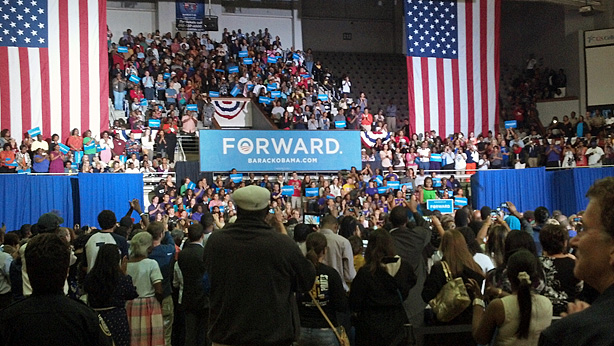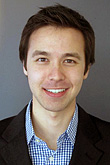
Michelle Obama speaks at an Obama campaign event in Greenville, N.C., in 2012, an event at which Alex Payne worked behind the scenes. Photo provided by Alex Payne.
Tales from the trail: Inside presidential campaigns
In the tightly choreographed world of presidential politics, Alex Payne '09, a staff consultant for President Barack Obama's re-election campaign, learned how quickly events can go off script.

Alex Payne
It was July 20, 2012. Payne and the campaign's advance planning team had been working all week to prepare a rally for Michelle Obama at Mary Washington University in the key swing state of Virginia. No sooner was every detail in place when word broke of the movie theater shooting in Aurora, Colo. The first lady's event was canceled.
"That was an experience in how an event is not completely in your control," says Payne, a policy analysis and management graduate of Cornell's College of Human Ecology.
On national campaigns, the advance team arrives early -- ideally a week before the event, Payne says -- to recruit audience members, coordinate with local and national press, work with the Secret Service and manage crowd movements before the main speaker, or "principal," arrives. The team splits its focus among three areas: crowd, site and press, Payne explains.
Payne worked as crowd lead, recruiting people to attend campaign events and setting up crowd logistics -- parking, bathrooms, crowd movements and the signs that will be held by audience members standing behind the speaker.
"On advance, it's all about execution and making the campaign event memorable," Payne says. "Our goal is to get good press coverage. The emphasis is on grassroots mobilization and building support across different voting groups."
Payne, who worked for Teach for America before joining the campaign, says his work for the campaign "reconfirmed skills I had learned in teaching, like juggling multiple responsibilities in a short time span."
Some of Payne's favorite memories and behind-the-scenes facts from the campaign:
- In Greenvile, N.C., he worked as the crowd lead and organized his former civics students (from his time in Teach For America) to stand behind the first lady so they could shake her hand and/or hug her. "They all were huge Obama supporters, and it was their first time ever attending a political event or seeing a political speech and they called it the most memorable part of their lives," Payne says.
- The placards that people hold up need to have a matte finish because a glossy finish causes the video lights to reflect too much. A last-minute solution for a glossy placard is to spray hair spray on the sign, cutting reflections way down.
- If you're looking to buy an American-made, non-luxury car, just ask anyone on the campaign advance team because they have driven every 2012-13 model. "The Ford Edge was my favorite," Payne says.
- The best resource Payne found for remembering the rules of presenting and hanging the American flag at events was a bookmark sold by Cracker Barrel.
The 2012 campaign wasn't Payne's first; between his junior and senior years of college, he served on Obama's campaign as an organizing fellow in 2008 doing "grunt work."
"In the primaries, I was getting really excited and inspired by him. I was a PAM major, and I knew policy was my interest, and I wanted to work where policy and politics interacted," he says.
But the experience wasn't an easy one: "In all honesty, I hated it," he says. "Going door to door asking a person to vote is different than asking someone to buy makeup, but the results and the responses are essentially the same. It's really hard to be rejected so many times, because you have to go to the next door -- you don't have time to recuperate from the rejection."
But when a Teach for America alumna offered him the chance to work on the 2012 campaign's advance team, Payne, who would soon graduate from Syracuse University's Maxwell School of Citizenship and Public Affairs, jumped at the chance.
Payne now works for the nonprofit Partnership for Public Service, where he interned during his time in the Cornell in Washington program. There, he conducts surveys to evaluate employee engagement and satisfaction; the data goes into rankings for potential job applicants. In August, Payne will be working on Capitol Hill for Rep. Rush Holt (D-New Jersey) as a Teach For America Capitol Hill Fellow.
In the future, Payne says he hopes to return to work "where policy and politics intersect," somewhere between policy work and lobbying, or campaigning: "I want to be somewhere in the middle, where you're advocating for an issue, but you're also an expert on that issue."
Sarah Cutler '16 is a student communications assistant for the College of Human Ecology.